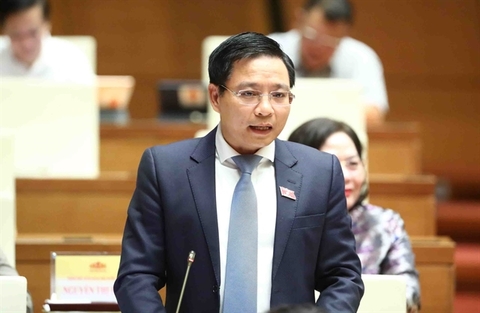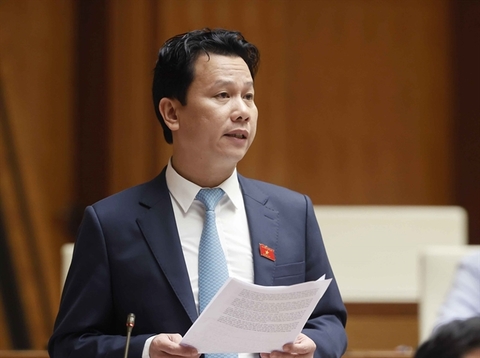
Minister of Transport Nguyễn Văn Thắng speaks at the question and answer session on Tuesday. VNA/VNS Photos Doãn Tấn
National Assembly (NA) deputies on Tuesday continued the question and answer session at the sixth session, with queries focusing on two key topics, including measures to attract investment in Public-Private-Partnership (PPP) projects and wastewater treatment in industrial clusters.
Many NA deputies expressed concerns regarding the implementation of Public-Private-Partnership (PPP) investment projects. While acknowledging the challenges in luring investors for PPP projects, some deputies voiced disagreement with Minister of Transport Nguyễn Văn Thắng's proposal to augment the Government's involvement in PPP ventures to entice private investors.
Deputy Phạm Thuý Chính from northern Hà Giang Province expressed the view that focusing too much on increasing the State's share in PPP projects might turn them into a different form of public investment. Instead, the State should commit to fulfilling its obligations in PPP projects, such as repurchasing projects if the State was at fault, providing balanced funding, and sharing the burden of reduced revenue.
These provisions are already detailed in the PPP Law, she said, adding that private investment would be attracted only when the State fulfilled its commitments.
Chính also stated that it was important to avoid focusing solely on the construction phase of PPP projects without considering the entire project lifecycle, including operation, maintenance and service provision. Furthermore, it was crucial to steer clear of viewing PPP investments as either public or purely private investments.
In response to these concerns, Minister Thắng acknowledged that the PPP Law, despite being enacted, had not yet attracted many businesses. Uneven distribution made it challenging to attract funding for PPP projects. Numerous PPP projects were encountering difficulties that remained unresolved, he said.
Thắng emphasised that increasing the State's capital share was not the decisive factor for the attractiveness of PPP infrastructure projects.
He stressed that there was a need for a change in mindset when inviting investments in transportation infrastructure. The Ministry of Transport had been preparing to complete the necessary conditions to hold conferences in collaboration with localities to promote investment in transportation infrastructure.
At the same time, it was crucial to attract corporate funding through mechanisms such as concession agreements and toll rights auctions, he added.
Deputy Vũ Tiến Lộc from Hà Nội suggested that the State should determine the capital share based on the nature and stage of each project. Especially when it comes to State capital in projects in difficult and remote areas that require infrastructure development, this approach should be followed.
The deputy recommended that the Government propose amendments to the PPP Law to better align it with current practices.
Minister Thắng further clarified that many countries did not set specific percentages for State capital participation. Instead, they evaluated the financial aspects of each project based on its nature and financial plan to balance the interests of citizens, businesses and the State.
He mentioned that the Ministry of Transport was planning to propose amendments to the PPP Law to attract more PPP investors in transportation infrastructure in the near future.

Minister of Natural Resources and Environment Đặng Quốc Khánh.
Commenting on the operation of centralised wastewater treatment systems, Deputy Lưu Bá Mạc from northern Lạng Sơn Province said that there were industrial zones that directly discharged untreated wastewater into the environment in some areas, causing environmental pollution and public dissatisfaction.
Mạc suggested that Minister of Natural Resources and Environment Đặng Quốc Khánh provide information on monitoring the construction and operation of centralised wastewater treatment systems, as well as the difficulties and solutions to be implemented in the near future.
In response to this issue, Minister Khánh clarified that in 2022, there were 291 industrial zones in the country, but only 265 of them had centralised wastewater treatment systems.
Among the 734 industrial clusters, only 179 had centralised wastewater treatment facilities. Out of the 26 industrial zones without wastewater treatment, seven were currently in the process of completion, but most of them were built in the past and therefore did not yet have specific mandatory requirements.
The Minister said that the ministry had issued numerous documents urging environmental protection and wastewater treatment activities in industrial zones and clusters. These included requirements outlined in the 2020 Environmental Protection Law, such as installing monitoring systems and automatic observation systems connected to the departments of Natural Resources and Environment and to the Ministry of Natural Resources and Environment.
In the near future, the ministry would allow new business industrial zones and clusters to operate only after meeting environmental protection criteria, such as wastewater treatment.
Furthermore, new industrial zones would be encouraged to operate water recycling systems to conserve water. The ministry would not accept new projects with increased wastewater generation within centralised production and business areas in clusters that do not have a wastewater collection system.
Khánh also suggested that cities and provinces continue to focus on directing investments in centralised wastewater treatment systems, especially in industrial clusters. They should also intensify inspection and administrative penalties related to this matter. — VNS